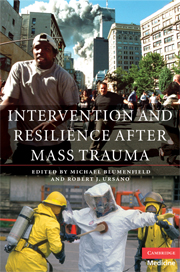Book contents
- Frontmatter
- Contents
- List of contributors
- Foreword by Joseph T. English
- Preface
- 1 Systems, science, and populations: Effective early mental health intervention following mass trauma: the roles of government, clinicians, and communities
- 2 Factors in the development of community resilience to disasters
- 3 Psychological first aid
- 4 Acute stress disorder and early interventions after trauma
- 5 The role of pharmacotherapy in early interventions
- 6 Should culture considerations influence early intervention?
- 7 Resilience is the default: how not to miss it
- 8 Epilog: Early intervention for individuals and communities: planning for the future while meeting present needs
- Index
- References
8 - Epilog: Early intervention for individuals and communities: planning for the future while meeting present needs
- Frontmatter
- Contents
- List of contributors
- Foreword by Joseph T. English
- Preface
- 1 Systems, science, and populations: Effective early mental health intervention following mass trauma: the roles of government, clinicians, and communities
- 2 Factors in the development of community resilience to disasters
- 3 Psychological first aid
- 4 Acute stress disorder and early interventions after trauma
- 5 The role of pharmacotherapy in early interventions
- 6 Should culture considerations influence early intervention?
- 7 Resilience is the default: how not to miss it
- 8 Epilog: Early intervention for individuals and communities: planning for the future while meeting present needs
- Index
- References
Summary
The Sidney E. Frank Conference as heard on the accompanying DVD and the revised ideas as presented in this book are a work in progress. As we conclude this book and the latest ideas of the outstanding authors who have participated in this project, we would like to reflect on where we are and where we may be going.
Mass trauma and disasters affect large and diverse populations. Interventions require rapid, effective, and sustained mobilization of resources (Ursano and Friedman, 2006). Intervention must both address individual care needs and sustain the social fabric of the community. Psychiatric illness, distress, and health risk behaviors must be addressed (Institute of Medicine, 2003; Raphael and Wooding, 2004). The medical care system, public health system, and emergency response system must work together to meet the health care needs of a mass disaster and in particular the mental health care needs.
Resilience of individuals and communities is the expected response to traumatic events and disaster. However, altered sense of safety, increased fear and arousal, and concern for the future, affects not only those who may develop mental health problems but also those who continue to work and care for their families and loved ones.
Intervention
Early intervention both for communities and individuals requires research, planning, and evaluation. A well-supported community mental health system is a necessary component of every public health infrastructure, including primary care sites for delivery of disaster mental health care.
Information
- Type
- Chapter
- Information
- Intervention and Resilience after Mass Trauma , pp. 173 - 178Publisher: Cambridge University PressPrint publication year: 2000
